In today’s rapidly evolving business landscape, HR departments worldwide are recognizing the pivotal role they play in maintaining and fostering a compliant work environment.
Everything from the ever-changing regulations and potential penalties to the sheer responsibility of safeguarding both your people’s rights and the company’s integrity makes understanding HR compliance crucial.
This comprehensive guide is here to help walk you through the essentials of HR compliance, providing you with a clear checklist to make sure you’re always up to date on the dos and don’ts.
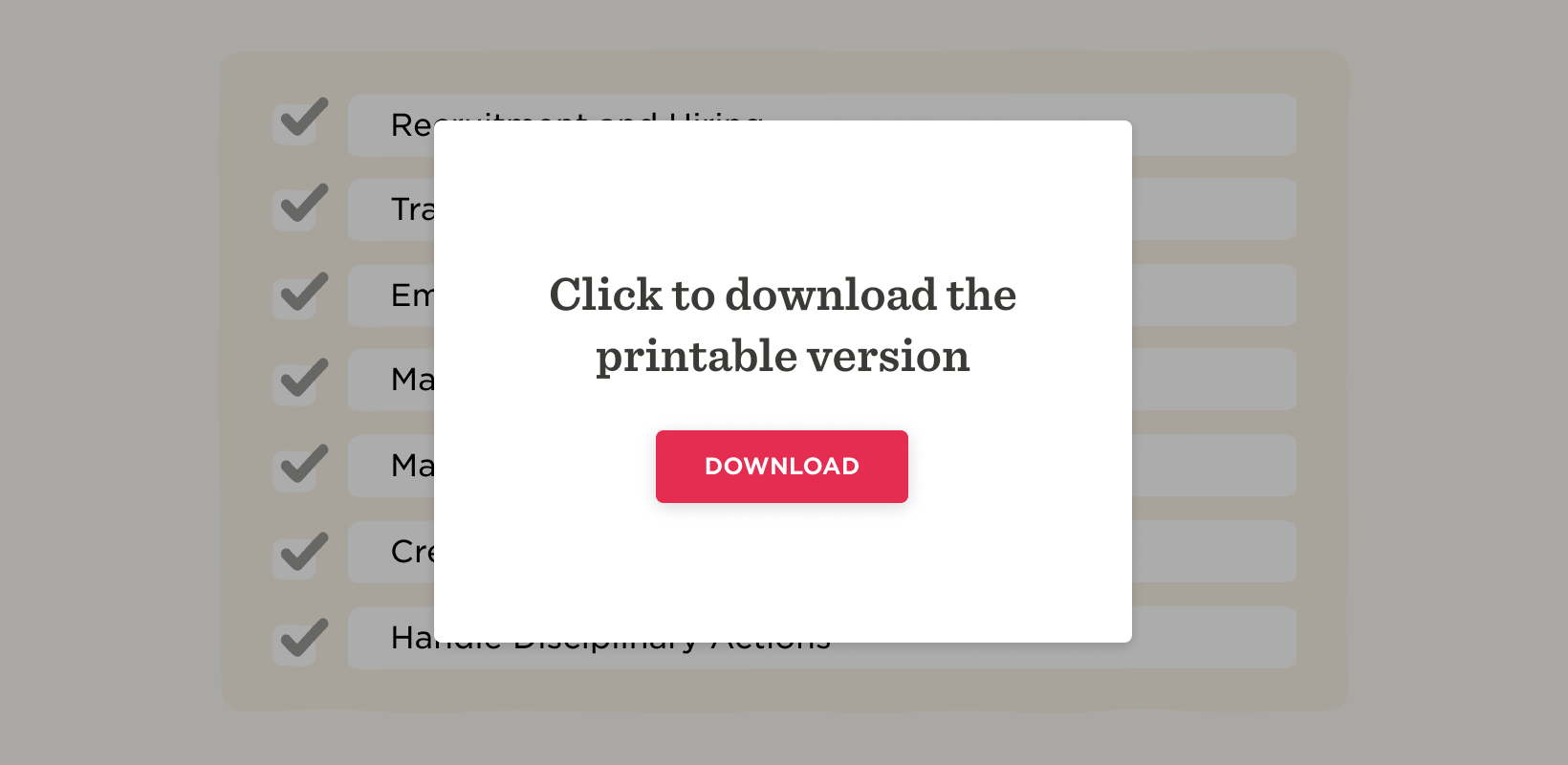
What is compliance in HR?
Compliance in HR refers to the process of making sure that the organization’s human resource practices are fully in line with the local, state, and federal labor and employment laws.
Full compliance includes everything from equal employment opportunity and workplace health and safety to benefits administration and much more.
HR compliance not only protects your business from potential legal mishaps but makes sure that you treat your people fairly and justly, which goes a long way toward building up a positive and safe workplace culture.
Why is compliance important to HR?
The HR department is rightly seen as the backbone of an organization. But it’s about far more than just managing and enabling people to succeed. It also stands as the guardian of organizations and their people when it comes to navigating the complexities of legal and ethical matters.
This makes ensuring compliance vital for several reasons:
- Avoiding legal penalties. In the dynamic world of labor laws, any sort of misstep can prove costly. Non-compliance can lead to several severe repercussions, from hefty fines and penalties to legal action that could harm the company’s future financial health. A proactive HR department can identify potential areas of risk and ensure all laws are followed—helping keep your organization on the straight and narrow.
- Protecting employee rights. At its heart, HR is about people. A primary function of HR is ensuring that every single person is treated equally and fairly under the law. This not only involves making sure your business follows anti-discrimination and equal employment law but also creating an environment where your people feel protected and valued.
- Maintaining company reputation. In the age of social media and digital communication, a company’s reputation constantly exists on a knife’s edge. A compliant HR department can foster trust among current and potential team members while signaling to business partners, stakeholders, and customers that the company operates with integrity and respect for all.
- Operational efficiency. Streamlined operations are one of the trademark signs of a successful business. Compliance guides standardized HR practices, ensuring companies run like well-oiled machines. By cutting down on errors, inconsistencies, and potential legal pitfalls, the company can focus its energy on growth and innovation.
To get a deeper understanding of how HR departments can streamline their adherence to legal and ethical standards and get a structured approach to evaluating and improving HR practices, check out our HR audit checklist.
HR compliance issues
The business world never stands still. With so much fluidity and change comes a constant slew of new challenges and opportunities.
In the realm of HR, keeping updated with the latest compliance requirements isn’t just a necessity, but a mandate to ensure smooth organizational operations.
While these issues and challenges will vary from sector to sector, there are a few common human resource compliance issues that are always worth looking out for. With that in mind, let’s delve into some of the significant HR compliance issues we face today.
- Data protection and privacy. Data has always been important. But the digital age has amplified that importance: Every click, every interaction, and every piece of information shared within your organization is a piece of data you need to protect. As cyber threats and data breaches become more and more common, the pressure to safeguard businesses’ sensitive information rises.
HR departments have a level of responsibility when it comes to ensuring that data collection, storage, and processing closely stick to the latest privacy regulations. This includes clear levels of communication with team members about how their data is used and ensures they’ve consented to its use when necessary.
- Diversity and inclusion. The global push for more inclusive workplaces has seen the term “diversity” go from a buzzword to a business imperative. Regulatory bodies worldwide are putting a large amount of emphasis on making sure workplaces aren’t just diverse, but fully inclusive.
HR departments now shoulder the responsibility for hiring practices that prevent discrimination, while also fostering a culture where everyone feels they belong and are respected. Continuous training, unbiased performance evaluations, and clear anti-discrimination policies are just a few ways HR can ensure compliance in this area.
- Remote work regulations. The global pandemic reshaped the way we work. Remote working has become the norm for people all over the world and is still prevalent in modern workplaces. However, with this shift comes new challenges for HR to keep up with. Regulations around work hours, compensation, benefits, and even workstation ergonomics have emerged. For example, do your remote team members have the same benefits as your office-based team members?
How can you ensure fair compensation for people working in different regions or countries with varying costs of living? These are just a few of the many considerations HR departments have to wrangle as they navigate the intricacies of remote work compliance.
Staying updated on these issues and the many more existing compliance challenges is essential for HR departments aiming to ensure seamless operations while protecting their organizations and their people.
For a structured overview of these issues and how to address them, take a look at our HR compliance checklist.
<<Download our HR compliance checklist>>
Your HR compliance checklist
Staying in line with modern-day rules and regulations can be tricky, and it’s never a great idea to rely on memory alone.
That’s why we’ve curated a checklist to ensure that in the fight for ultimate compliance, you’re not just ticking boxes, but truly safeguarding your organization and your people.
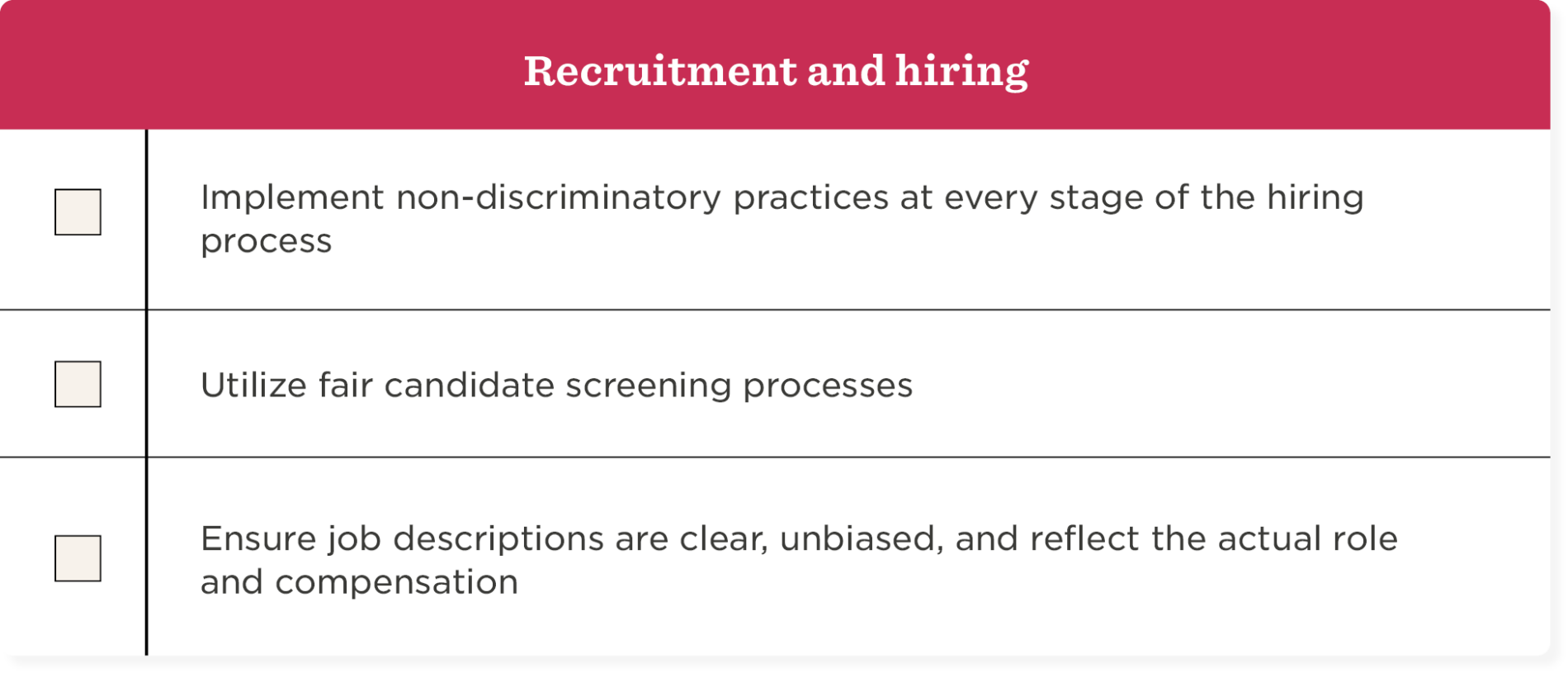
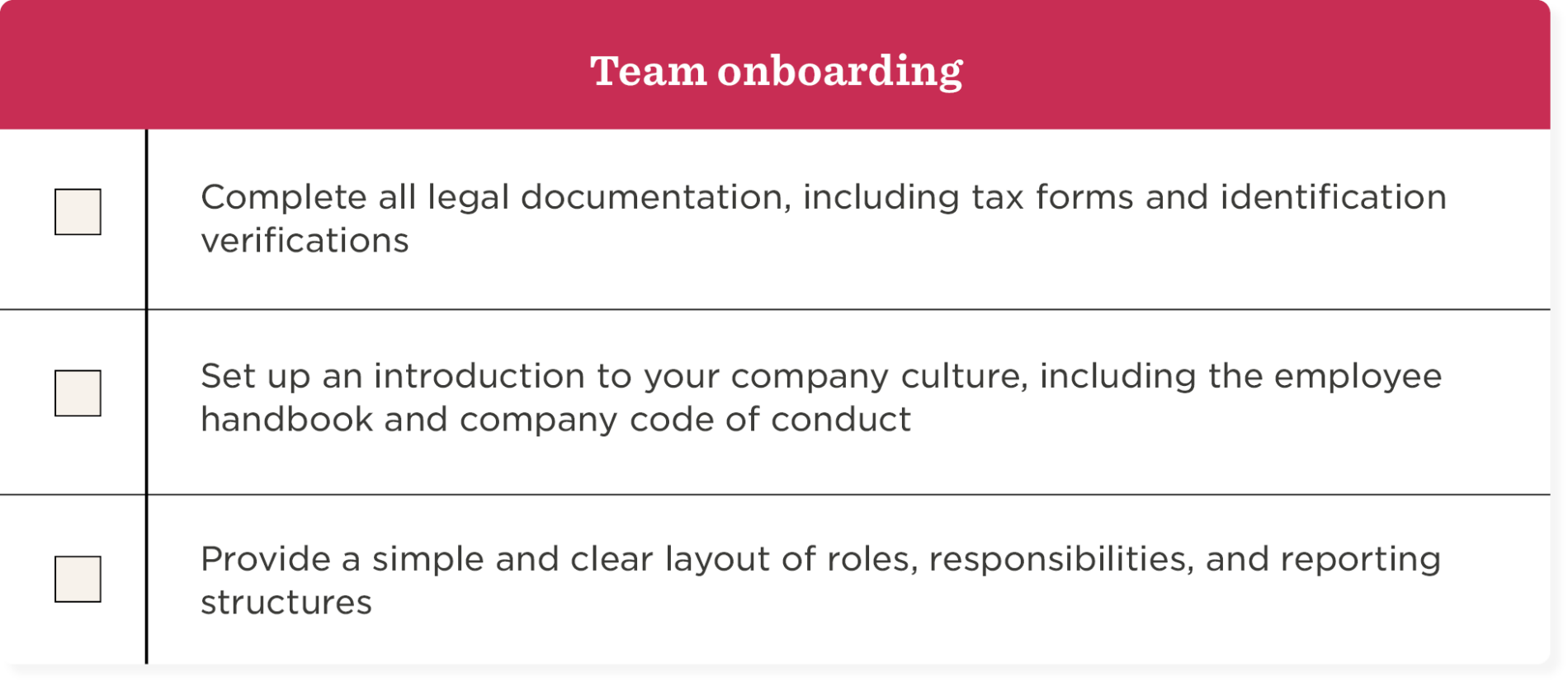
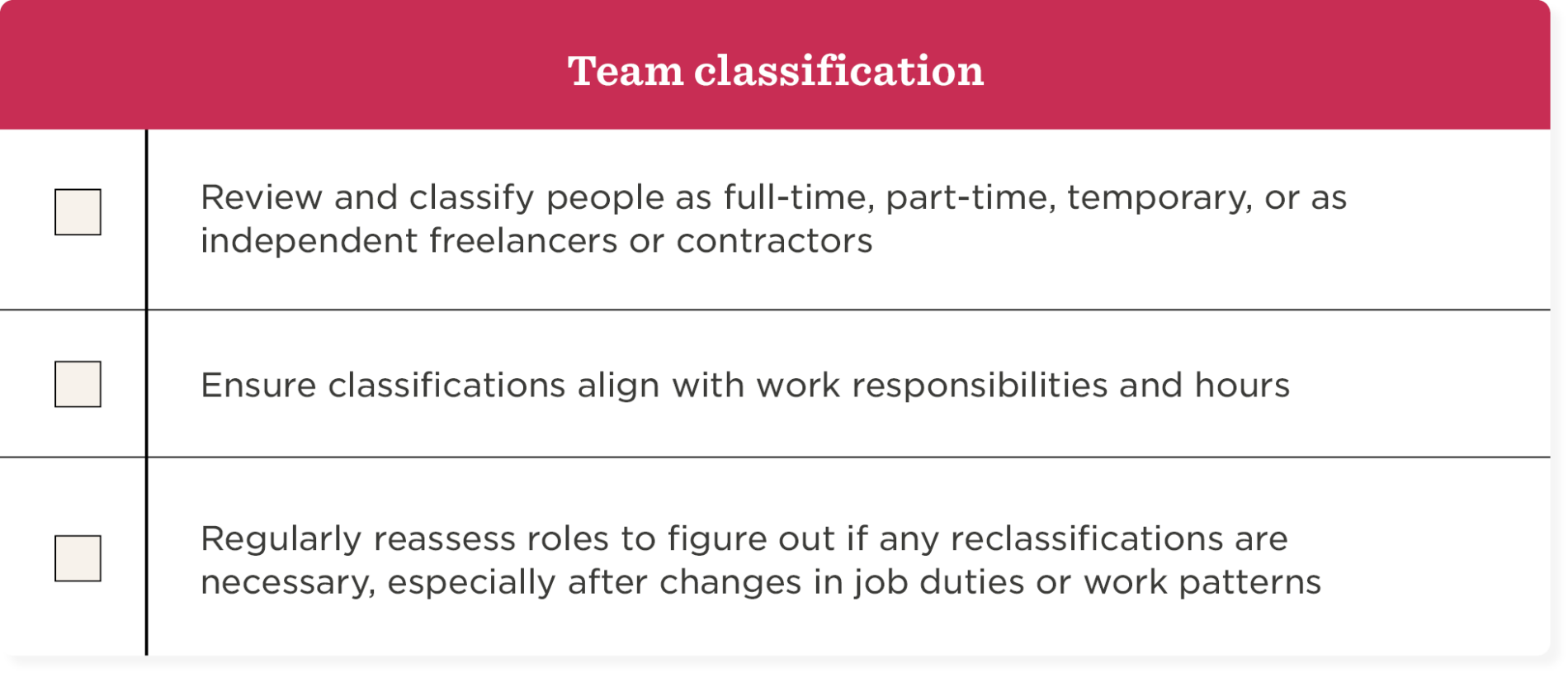
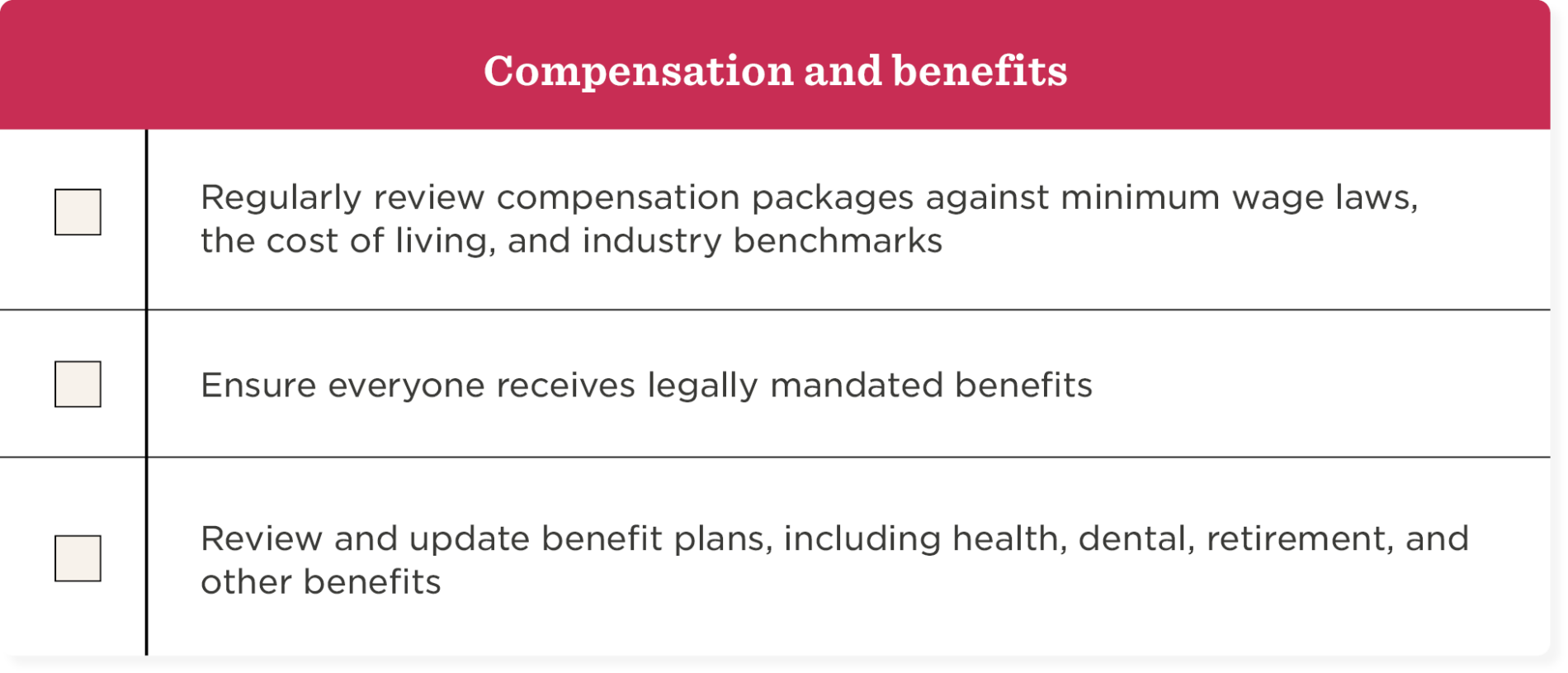
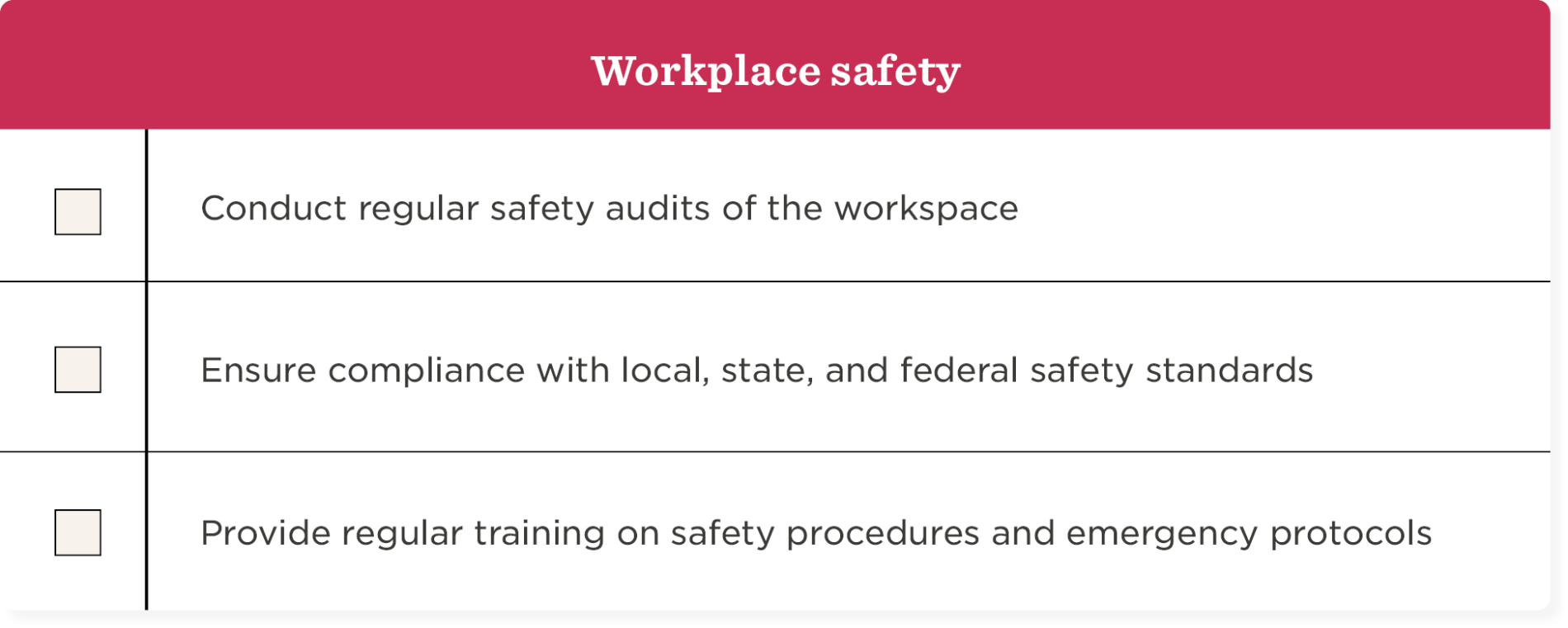
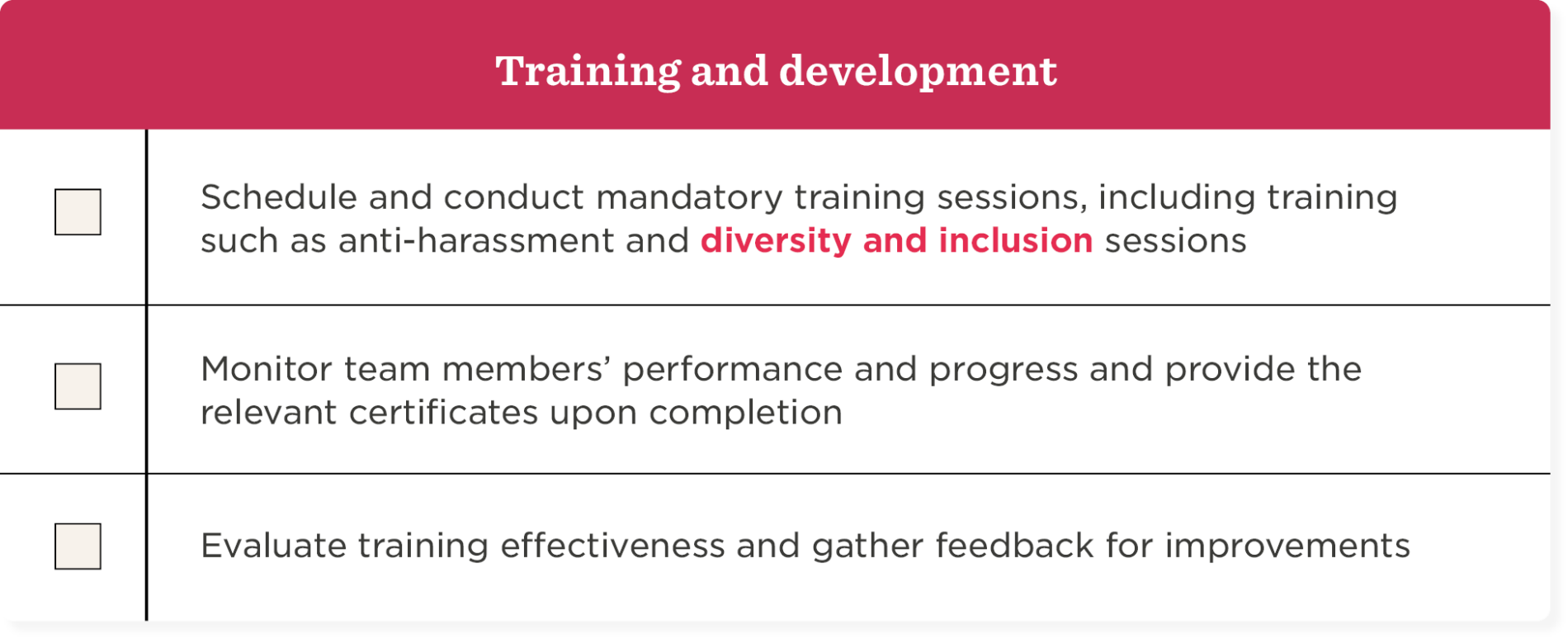
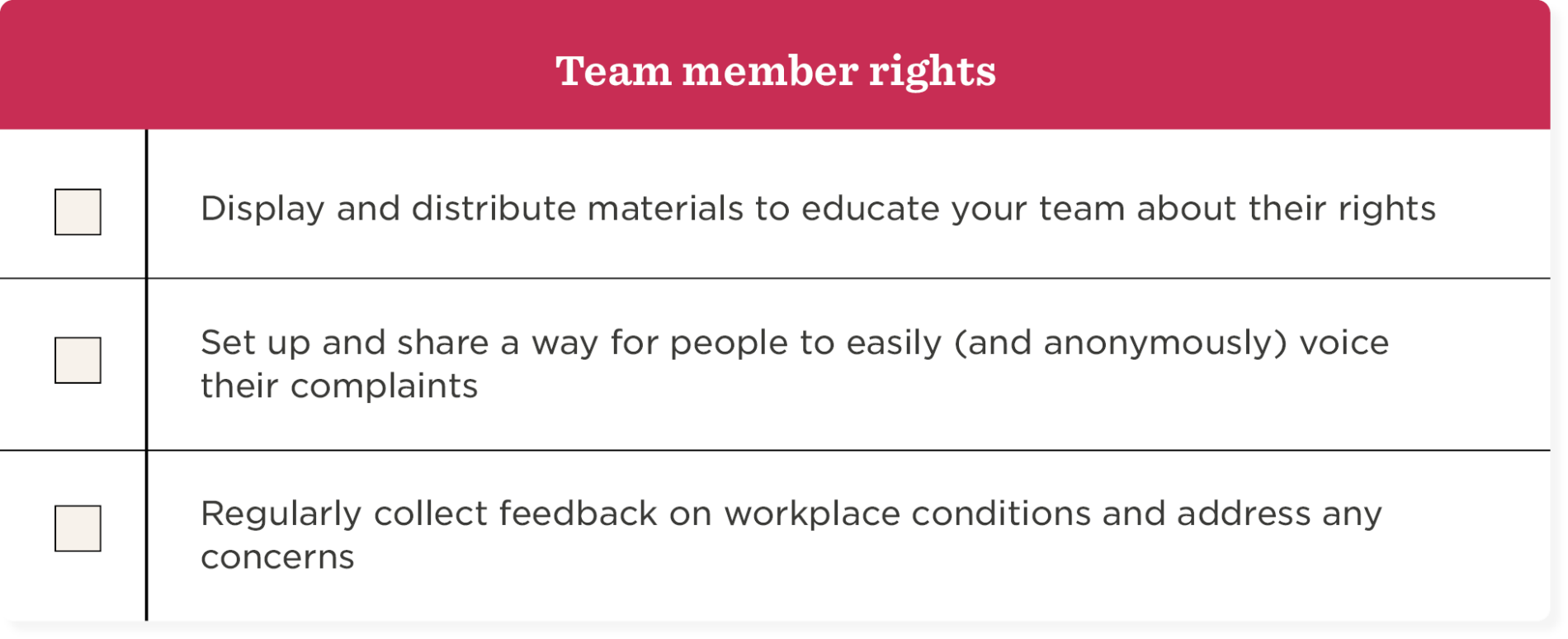
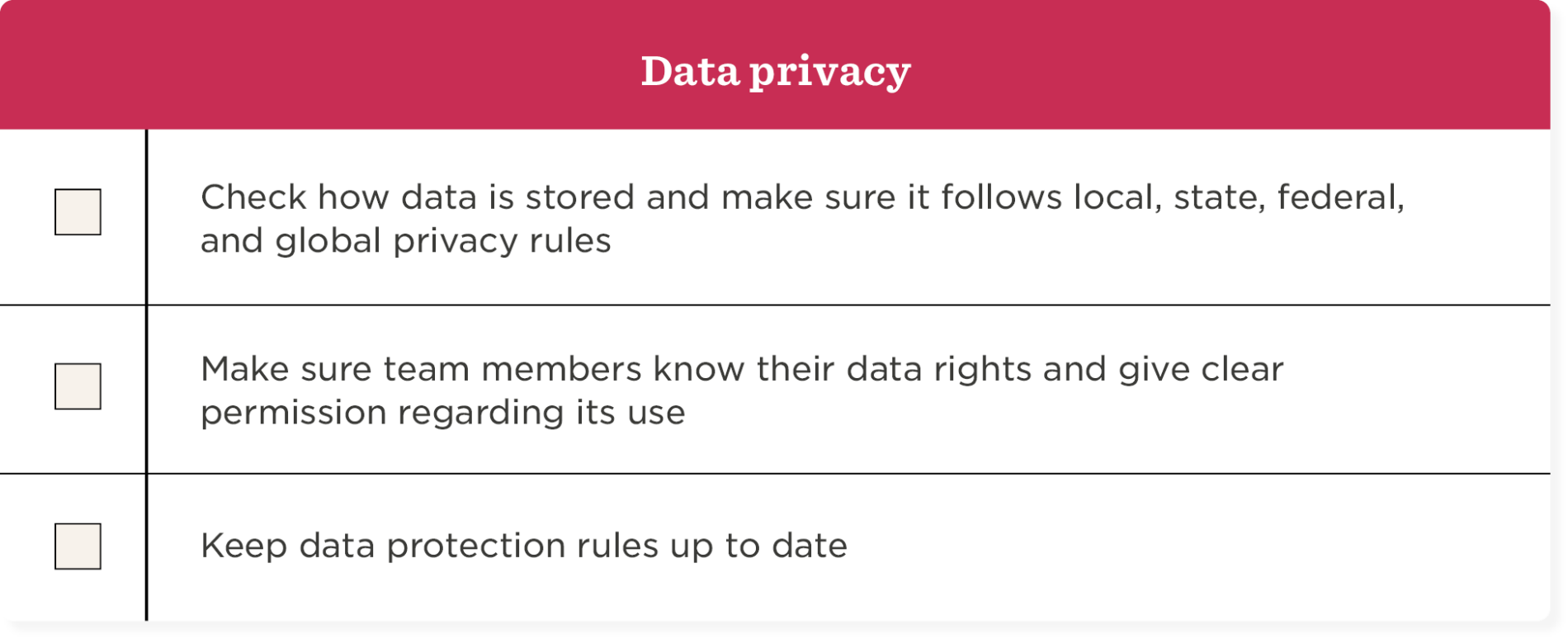
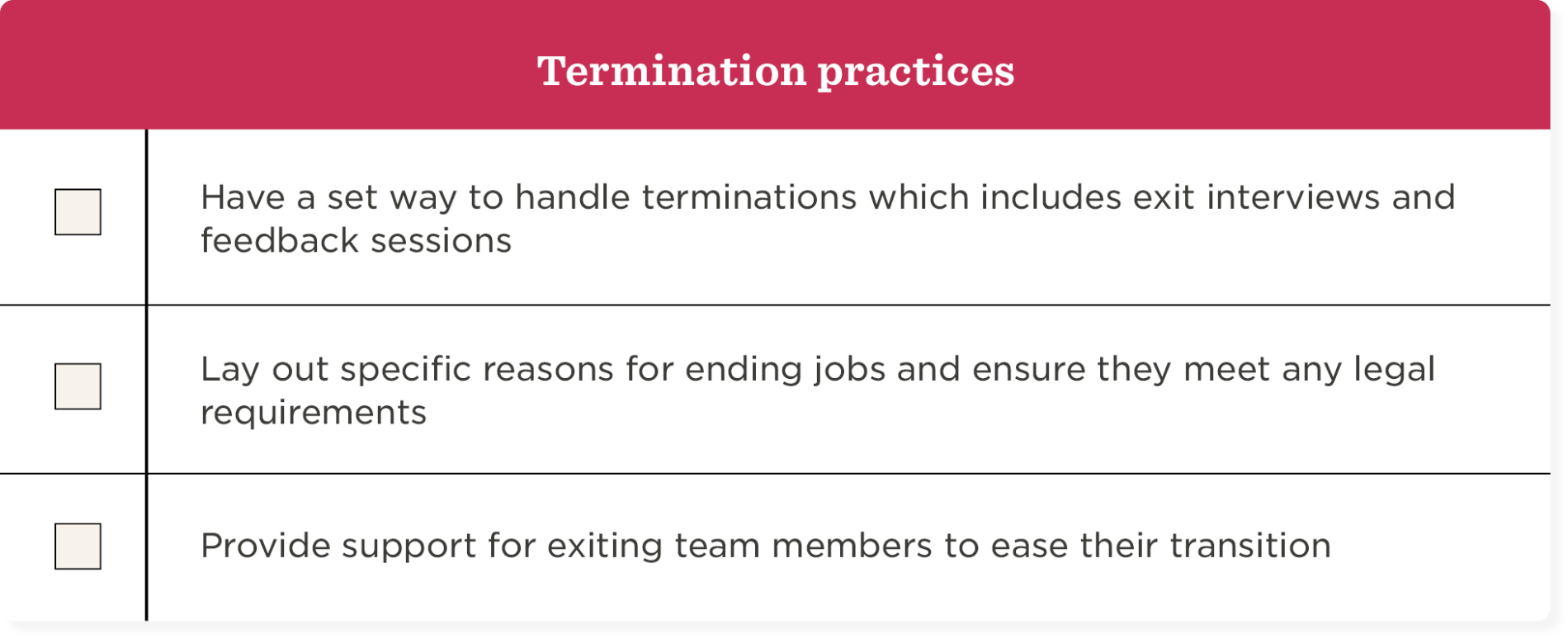
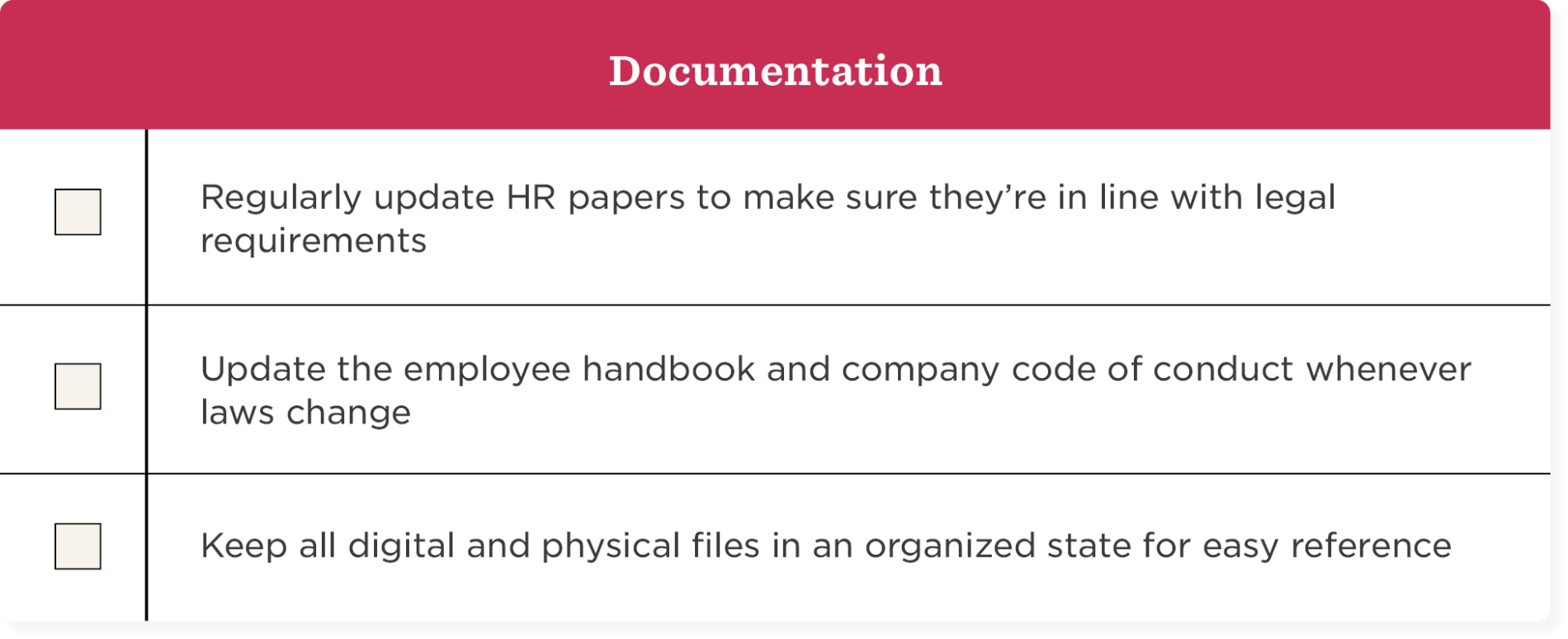
<<Download our HR compliance checklist>>
Best practices for HR compliance
Navigating the intricacies of HR compliance can be daunting. But by sticking to best practices, HR professionals can proactively mitigate risk and ensure that operations stay as smooth as possible.
Here are a few of the best practices to keep to.
- Stay updated. HR compliance never sits still. Due to its ever-evolving nature, it’s important to regularly review local, state, and federal regulations to make sure you’re always up to date. Conducting periodic HR audits can help ensure all of your internal practices align with your regulations. You can also do this by signing up to newsletters, joining HR forums, or participating in seminars.
- Emphasize training. Of course, it’s important that your HR team is aware of compliance mandates, but it’s also valuable to have the rest of your team in the know, too. From entry-level to senior management, having a team well-informed about compliance issues, including their rights and responsibilities, is a major help in the bid to stay compliant.
- Maintain documentation. Clear and meticulous record-keeping is an HR professional’s best friend. Maintaining clear records on all aspects of the job, from recruitment to separation and termination, helps to make sure all of your vital information is readily accessible when needed.
- Seek external expertise. While your HR team might have a deep well of knowledge, certain complex situations may come up where the expertise of a legal professional is invaluable. In these cases, don’t hesitate to get some outside help from legal experts.
These HR best practices can help you make sure you’re always a step ahead, and stay at the forefront of compliance.
Recommended For Further Reading
HR tech and compliance challenges
Digital transformation comes with its fair share of challenges. And as HR continues its trajectory, the fusion of technology into its operations will bring up some issues such as:
- Data security. With the adoption of human resource information systems (HRIS) and human capital management (HCM) systems, the safekeeping of sensitive team data becomes a priority. Implement stringent security protocols and conduct regular cybersecurity audits to help guard against any potential breaches.
- Regulatory updates. HR tech solutions aren’t static, they evolve alongside ever-shifting laws and regulations. Make sure that your HR tech supplier offers updates in response to regulatory changes, and prioritize those updates in your system.
- Team training. The introduction of new technology often brings about the need for change management. It’s good practice to make sure your whole team, even those without a tech background, are comfortable with new systems. Regular training sessions and dedicated IT support can help smooth this transition—and make sure everyone is aware of digital compliance parameters.
Compliance never stands still
Navigating the intricate pathway of HR compliance is crucial for the longevity and integrity of any organization. Staying informed, adopting best practices, and leveraging HR tech will ensure your company stands on the straight and narrow now, and in the future.
Just remember, prioritizing the wellbeing and rights of your team members creates a strong backbone to build and sustain the success of your organization.
